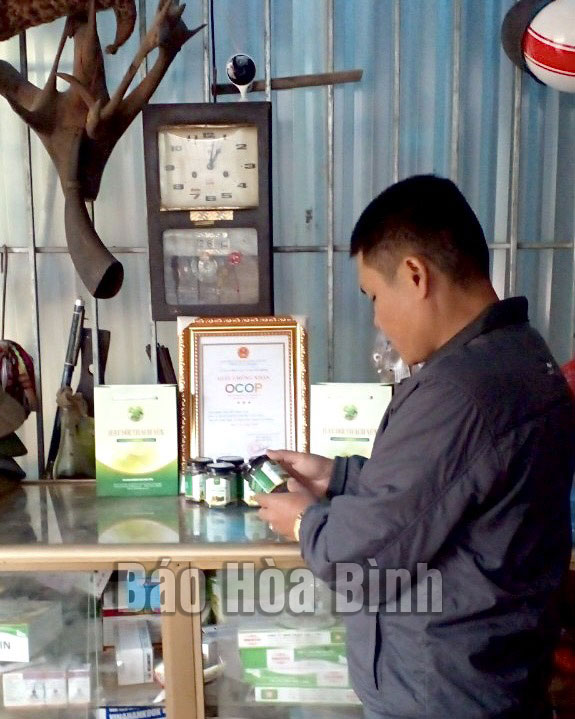
(HBO) - Ngai village in Thach Yen commune, Cao Phong district is home to about 100 natural doi trees. Bui Van Tien’s family living there has cared for and expanded farming area with the hope of turning the product into a high-quality specialty to put up for sales in the market.

Thach Yen doi seeds are recognised as a three-starred
One Commune, One Product product
Doi tree belongs to the wood line with an average height of about 15-20m and
the canopy of tens of meters in width. This kind of plant usually grows on
open, fresh and sunny hills. Since ancient times, Muong and Thai ethnic people
in Hoa Binh have used doi seeds as a spice to create a unique flavor for ethnic
dishes. Apart from being used as a spice, doi seeds are used as a medicine to
support the treatment of digestive problems, soak in alcohol as a massage
medicine to treat pains, or can be drunk as a medicinal wine with an amount
small enough each day to improve health.
Tien said after carefully learning about doi trees, he went to neighbouring
areas to learn experience in organic farming. The cultivation process is not
too complicated. From the fifth year onwards, there is almost no need to take
care of them. After being picked and dried, the fresh seeds will turn from red
to black
The harvest season of this "black gem" lasts from September to
November, with trees yielding up to 30 kg of dry seeds. With the market price
of over 2 million VND per kg of dry seeds, this kind of plant has high and
sustainable economic value, contributing to reducing poverty in the locality.
The bottle is full of information about the production facility and stamp with
a QR code to make it easier for customers to trace the origin.
Thach Yen doi seeds have been recognised by the provincial People’s Committee
as a three-starred One Commune, One Product (OCOP) product since 2020. However,
they are mostly produced on a household scale which is fragmented and small.
With the selling price of 250,000 VND for a 100g bottle, Tien has sold over
10kg of dried doi seeds since early this year. In order to improve product
quality, it is necessary to gain the support and companionship of authorities
at all levels, develop appropriate forms of production to stimulate the process
of linking production and consumption, strengthen trade promotion to expand
consumption, support in-depth training for those involved in the OCOP Programme
to have knowledge of production management and marketing.
According to data from the Hoa Binh Provincial Party Committee, the industrial production index for the first six months of 2025 is estimated to have increased by 20% compared to the same period last year. This marks the highest year-on-year growth rate for this period since 2020.
In the first six months of 2025, Hoa Binh province’s export turnover was estimated at 1.145 billion USD, marking an 18.11% increase compared to the same period in 2024. Import turnover was estimated at $ 804 million, a 17.15% increase, which helped the province maintain a positive trade balance.
The lives of the ethnic minority farmers in Tan Lac district have gradually improved thanks to the new directions in agricultural production. This is a testament to the collective strength fostered through the professional associations and groups implemented by various levels of the district’s Farmers’ Union.
With the motto the "product quality comes first,” after nearly one year of establishment and operation, Muong village’s Clean Food Agricultural and Commercial Cooperative, located in Cau Hamlet, Hung Son Commune (Kim Boi district), has launched reputable, high-quality agricultural products to the market that are well-received by consumers. The products such as Muong village’s pork sausage, salt-cured chicken, and salt-cured pork hocks have gradually carved out a place in the market and they are on the path to obtaining the OCOP certification.
In the past, the phrase "bumper harvest, rock-bottom prices" was a familiar refrain for Vietnamese farmers engaged in fragmented, small-scale agriculture. But today, a new spirit is emerging across rural areas of Hoa Binh province - one of collaboration, organisation, and collective economic models that provide a stable foundation for production.
Maintaining growing area codes and packing facility codes in accordance with regulations is a mandatory requirement for agricultural products to be eligible for export. Recently, the Department of Agriculture and Environment of Hoa Binh province has intensified technical supervision of designated farming areas and packing facilities to safeguard the "green passport" that enables its products to access international markets.



